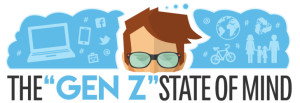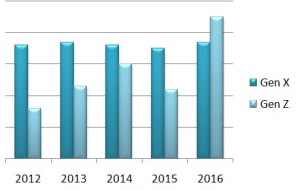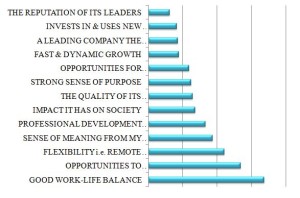Challenges with the “GEN Z” and ways to overcome it

Gen Z is the younger generation joining the workforce in an industry or a corporate. The Gen Z in any industry has different expectations and perspective for the job. The Gen Z are well educated, skilled in technology, self-confident, multi-tasking, and have plenty of energy. They have high expectations for themselves hence they understand that to reach ahead they should collaborate and work in teams. Gen Z seeks challenges their work provides them with the adrenaline to move forward with life.

Presently the Gen Z form more than fifty percent of the total workforce and the rest fifty percent comprises of the Gen-X. And it’s the duty of the managers to unite the two, Gen X and the Gen Z, keep them motivated and dedicated towards their job hence derive the most productive outcome.
Gen Z are now the largest Work Force

To briefly summarise the foundations of challenges faced by the line managers are:
- Generation gap(Which is the origin of all the issues)
- Engagement Strategy
- Career progressions
And to build an empire we cannot allow weak foundations.

Generation gap:
The Gen Z have a different working style from the Gen-X. Let me sketch an image for you a twenty-three-year-old working next to a sixty-year-old person, adding on to the image say the younger one is a newly joined intern and the other guy is an old employee. The duo when given an assignment, the millennials grabs hold of a gadget and starts looking for feasible solutions for the situation wherein the Gen-X sits down and analyses the situations and tries to find a solution based on his prior experiences.
Both of them would come up with some feasible solution but their approach is different. The Gen Z are fiercer and more creative in their approach as well as in their decisions. Gen Z’s enthusiasm for trying new things could be used to encourage a culture of innovation, while older workers can leverage their experience and broad perspective to help Gen Z understand some of the costs and risks associated with their ideas. The concerns and needs of an ageing employee are often much different than that of a Gen Z fresh out of college.

Engagement Strategy:
The Gen Z know that they are the face of the fast pace world and can achieve heights with their talent. Hence to keep then keen about their work in an organisation is a difficult task for the line managers. If a Gen Z thinks that he is not getting satisfaction from his work he would leave. They are notorious job-hoppers. Employee engagement is very important as the talent retention depends on this. This can add a competitive advantage for businesses over the coming years.

Career progressions:
According to Forbes, 91% of Gen Z professionals think career progression is among the top priorities. When it comes to future career opportunities, Gen Z value a good work/life balance. Companies that offer their employees opportunities to progress and a degree of flexibility (such as remote working possibilities) are also attractive to the Gen Z.
Gen Z believes in life after work

In addition to rapid progression and formal plans for their career development, the research also revealed that Gen Z required regular formal feedback from their employer. 60% of Gen Z surveyed said that they would like to receive formal feedback every one to three months. This would provide them with an opportunity to improve and develop their skills.
These are the issues now we need to find solutions for this.
Based on the surveys, the Gen Z have a strong desire to work overseas and this is a rich potential resource for organisations focused on global growth. Less desirable locations could be positioned as an important career path milestone. Every opportunity should also be taken to mix teams gene-rationally.
Give them flexibility and freedom to work in their own style. Gen Z needs clear instructions and concrete targets. They can be as creative they want to achieve that.
We need a well thought of engagement strategy but solely a strategy is not enough. The employees must be receptive towards the strategies. The results of these strategies can help the company understand those drivers on which Gen Z are aligned – and those on which they are not aligned. Whether a driver is more or less important for Gen Z is only the first indicator. There is a difference in how Gen Z react to a driver and how the Gen-X reacts to it, the generation gap is directly proportionate to the adjustments in the motivation drivers.
Managing performance is the most engaging driver. Gen Z strives for regular feedback for their improvement. Conducting annual engagement studies to facilitate the engagement monitoring process, ensuring participation is the role of the manager. Later the employers must demonstrate the strategic value of the studies to employees and show tangible outcomes as a result of doing the work.
Set appropriate targets and goals, goal-setting exercises must be properly designed in order to develop reasonable targets. There are multiple ways to think about setting targets.
Assigning responsibilities to the Gen Z gives them the motivation to prove their worth and they excel under this pressure. Making them a part of the vision of the company, giving them the entire picture of their role in a larger plan gives them a clearer sense of purpose. Allowing Gen Z to form committees and use company resources or time to organise their causes meets their desire for social consciousness.
The managers can consult the board and develop in-between steps and titles which can meet the Gen Z desire for career progression. This provides an incremental training and experience that will aid them later in career advancement opportunities.
Facilitating further education and professional development helps the manager to retain the right talent. Providing them time and space for their personal projects is also a key to reducing attrition.

Finally, I would conclude that the managers are responsible for the smooth running of the organisation. Hence they are accountable to bring the Gen-X, Gen-Y and Gen-Z together and reap fruitful returns for the organisation.
References:
By-Abhilasha Bakhla – Summer Interns – B. Arch from BIT MESRA & Pursuing MBA in HR – IIM Ranchi
Supervision By – Rishi Raman
Leave a Reply